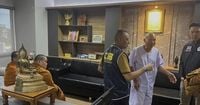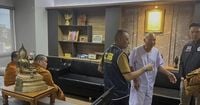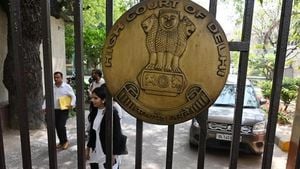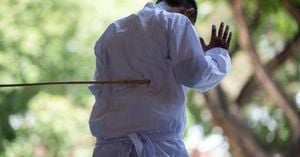In a dramatic turn of events that has sent shockwaves through Thailand's religious and philanthropic circles, Luang Phor Alongkot—once celebrated as a compassionate Buddhist monk and the founder of a pioneering AIDS hospice—was arrested on August 26, 2025, on grave charges including embezzlement, dereliction of duty, malfeasance, and money laundering. Alongkot, also known by his formal name Phra Ratcha Wisutthiprachanat, was taken into custody at the Wat Phra Bat Namphu temple in Lopburi province, a place that for decades symbolized hope for patients with HIV/AIDS and their families.
According to Bangkok Post and Associated Press reports, the arrest was executed by the Crime Suppression Division (CSD) of the Thai police at 1 a.m., as Alongkot was allegedly attempting to leave the temple grounds. Authorities suspected this was an effort to evade the mounting investigation. He was subsequently transported to the CSD facility in Bangkok for questioning. The Central Criminal Court for Corruption and Misconduct Cases had issued an arrest warrant on August 22, 2025, citing concerns about the management of temple funds and the use of donations intended for the hospice and other charitable projects.
Alongkot, 65, was not alone in facing legal scrutiny. Seksan "Mor Bee" Sapsubbsakul, a 43-year-old influencer and self-proclaimed spiritual medium who assisted in fundraising for the temple, was also arrested. Police sources indicated that Sapsubbsakul was taken to several key sites to aid in the collection of evidence. The arrests were part of a broader sweep, with raids conducted across 17 locations in Bangkok and Lopburi, all linked to the ongoing investigation into financial mismanagement at the temple.
Before formal charges could be brought, Alongkot was required to disrobe—a symbolic and procedural step in Thai law when monks face criminal proceedings. "Initially, the monk cooperated well with the police and was willing to be disrobed without force. He understood the difference between Buddhist discipline and the legal process," Jaroonkiat Pankaew, deputy commissioner at the Central Investigation Bureau, told reporters, as cited by AP. Jaroonkiat added, "I told him that he did things that benefit people and other things that were illegal and he had to bear the consequences." Despite the mounting evidence and public scrutiny, Alongkot has steadfastly denied any wrongdoing.
The roots of this scandal stretch back to the early 1990s, when Alongkot established the hospice at Wat Phra Bat Namphu. At its inception in 1992, the hospice was lauded as a groundbreaking humanitarian project, providing care for those living with HIV/AIDS at a time when social stigma and limited treatment options left many patients isolated and destitute. Over the years, as antiretroviral therapies became widely available and public understanding of AIDS improved, the hospice’s central role diminished. Alongkot responded by expanding the temple’s facilities to treat individuals with other serious illnesses and by launching various charities aimed at supporting the education of underprivileged children.
However, the temple’s growing financial footprint soon attracted attention. Six affiliated foundations, all established under Alongkot’s direction, were set up to channel funds toward charitable and social welfare projects. The temple owns a plot of land in Lopburi’s Mueang district, while an additional 33 landholdings linked to a former administrator are now under review. Eight active bank accounts were reportedly used to receive donations, both in cash and via bank transfers, with the funds then distributed to the foundations supporting the poor, HIV/AIDS patients, and educational initiatives.
The charges against Alongkot are not limited to financial mismanagement. Thai authorities have also raised concerns about his personal records and background. The National Office of Buddhism (NOB) renewed its probe after discrepancies emerged in Alongkot’s identity documents. According to the Bangkok Post, he changed his lay name from Kriengkrai Phetkaeo to Alongkot Pulmuk—strikingly similar to the name of a deceased irrigation official, Alongkot Polmuk, whose identification was allegedly used to open a bank account for the hospice fund. This revelation further deepened suspicions about the transparency of the temple’s financial operations.
Investigators also cast doubt on Alongkot’s educational credentials. An online biography claimed he was an alumnus of Depsirin School, held an engineering degree from Kasetsart University, and a master’s degree from Australia. However, reporters and police found no records to support these assertions, concluding that Alongkot had completed only primary education. This discovery added fuel to the controversy and called into question the authenticity of other claims made by the monk.
The investigation intensified in the weeks leading up to Alongkot’s arrest, as rumors swirled about possible mismanagement of the substantial donations that had flowed into the temple over the past three decades. On the day of the arrest, police searched the temple, seizing financial documents—including records of donations and expenses dating back to 2019—and impounded several land title deeds. State audit officials were present during the raid, underscoring the seriousness with which the Thai government is treating the case.
As the scandal unfolded, Alongkot resigned from his position as abbot of Wat Phra Bat Namphu, a move that many observers saw as an acknowledgment of the growing pressure and speculation. The temple, once a symbol of compassion and innovation in the fight against HIV/AIDS, now finds itself at the center of a national reckoning over transparency, accountability, and the responsibilities of religious leaders entrusted with public donations.
For Thailand’s Buddhist community, the case has sparked difficult conversations about the intersection of faith, charity, and governance. The malfeasance charge against Alongkot is particularly significant, as Buddhist monks in Thailand are considered government officials, subject to the same legal standards as secular administrators. This legal framework is intended to uphold the integrity of the clergy, but it also means that alleged transgressions are treated with the full weight of the law.
Meanwhile, the fate of the hospice and its associated charities hangs in the balance. The temple’s six foundations, its land holdings, and its bank accounts are all under review, and the authorities have pledged to ensure that any misappropriated funds are traced and, if possible, restored to their intended beneficiaries. For the thousands of Thais who have donated to the temple over the years—often moved by Alongkot’s message of compassion for society’s most vulnerable—the scandal is both a shock and a sobering reminder of the need for vigilance in charitable giving.
As the legal process unfolds and the investigation continues, the case of Luang Phor Alongkot stands as a cautionary tale about the complexities and pitfalls of religious philanthropy in the modern era. The story, once one of hope and healing, now serves as a stark illustration of how trust can be eroded, but also of the enduring importance of transparency and accountability in the stewardship of public faith and resources.






